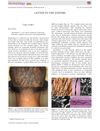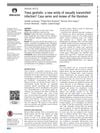 22 citations,
April 1985 in “Australasian Journal of Dermatology”
22 citations,
April 1985 in “Australasian Journal of Dermatology” Beta-blockers can cause rare skin side-effects, which usually improve after stopping the medication.
 18 citations,
January 2017 in “Annals of dermatology/Annals of Dermatology”
18 citations,
January 2017 in “Annals of dermatology/Annals of Dermatology” Certain immune cells contribute to severe hair loss in chronic alopecia areata, with Th17 cells possibly having a bigger impact than cytotoxic T cells.
 17 citations,
September 2003 in “Journal of Investigative Dermatology Symposium Proceedings”
17 citations,
September 2003 in “Journal of Investigative Dermatology Symposium Proceedings” Old treatments for other skin conditions showed promise for hair regrowth in mice with a hair loss condition.
[object Object]  3 citations,
May 2019 in “International journal of research in dermatology”
3 citations,
May 2019 in “International journal of research in dermatology” Platelet rich plasma is an effective treatment for alopecia areata.
 3 citations,
March 2014 in “Journal of Industrial Microbiology & Biotechnology”
3 citations,
March 2014 in “Journal of Industrial Microbiology & Biotechnology” Scientists found a new gene in a bacterium that can modify an immunosuppressant drug, potentially helping to treat hair loss.
 2 citations,
December 2023 in “Journal of clinical immunology”
2 citations,
December 2023 in “Journal of clinical immunology” Ruxolitinib significantly improves multiple autoimmune conditions in APS-1 patients.
 2 citations,
August 2014 in “Archivos argentinos de pediatría”
2 citations,
August 2014 in “Archivos argentinos de pediatría” A 6-year-old girl with Turner syndrome also had psoriasis, alopecia areata, and trachyonychia.
 1 citations,
February 2018 in “Australasian journal of dermatology”
1 citations,
February 2018 in “Australasian journal of dermatology” Advanced imaging techniques are crucial for accurately diagnosing Monilethrix, a rare hair disorder.
 December 2024 in “International Ayurvedic Medical Journal”
December 2024 in “International Ayurvedic Medical Journal” Ayurvedic treatments may help reduce hypothyroidism symptoms.
 October 2024 in “Reumatizam”
October 2024 in “Reumatizam” New treatments and understanding of skin lupus are emerging in 2024.
 June 2024 in “Dermatology and Therapy”
June 2024 in “Dermatology and Therapy” Baricitinib improves quality of life and reduces anxiety and depression in severe alopecia areata patients with hair regrowth.
 April 2024 in “Medical & clinical research”
April 2024 in “Medical & clinical research” More research is needed to find the best long-term treatments for Alopecia Areata.
 December 2023 in “Research Square (Research Square)”
December 2023 in “Research Square (Research Square)” 12-Methoxy carnosic acid from rosemary might be a good natural treatment for hair loss.
 July 2021 in “PARIPEX INDIAN JOURNAL OF RESEARCH”
July 2021 in “PARIPEX INDIAN JOURNAL OF RESEARCH” PRP injections significantly improve hair regrowth in alopecia areata.
 July 2021 in “Journal of emerging technologies and innovative research”
July 2021 in “Journal of emerging technologies and innovative research” Ayurvedic methods successfully treated severe acne in a patient.
 January 2011 in “Medicina interna de México”
January 2011 in “Medicina interna de México” The document concludes that treating the underlying causes of telogen effluvium usually results in hair regrowth.
 349 citations,
January 2005 in “The FASEB journal”
349 citations,
January 2005 in “The FASEB journal” Human skin can make serotonin and melatonin, which help protect and maintain it.
 252 citations,
January 2008 in “Trends in Endocrinology and Metabolism”
252 citations,
January 2008 in “Trends in Endocrinology and Metabolism” Melatonin in the skin helps protect against damage from stress and UV rays, and could be used to treat certain skin conditions.
 146 citations,
July 2003 in “Journal of the American Academy of Dermatology”
146 citations,
July 2003 in “Journal of the American Academy of Dermatology” Clobetasol propionate ointment can help some people with total hair loss regrow hair.
 122 citations,
November 1984 in “Journal of the American Academy of Dermatology”
122 citations,
November 1984 in “Journal of the American Academy of Dermatology” No single treatment is consistently effective for alopecia areata, and more research is needed.
 94 citations,
February 1994 in “The journal of investigative dermatology/Journal of investigative dermatology”
94 citations,
February 1994 in “The journal of investigative dermatology/Journal of investigative dermatology” EGF makes hair follicles grow longer but stops hair production.
 91 citations,
May 2003 in “American Journal of Pathology”
91 citations,
May 2003 in “American Journal of Pathology” Prolactin affects hair growth cycles and can cause early hair follicle regression.
 86 citations,
July 2020 in “International Journal of Molecular Sciences”
86 citations,
July 2020 in “International Journal of Molecular Sciences” Activating the Wnt/β-catenin pathway could lead to new hair loss treatments.
 81 citations,
December 2009 in “Journal of Dermatological Science”
81 citations,
December 2009 in “Journal of Dermatological Science” Fat tissue stem cells may help increase hair growth.
 72 citations,
October 2010 in “Journal of The American Academy of Dermatology”
72 citations,
October 2010 in “Journal of The American Academy of Dermatology” Iron deficiency common in women, not always linked to hair loss; more research needed.
 67 citations,
July 2016 in “Reviews in Endocrine and Metabolic Disorders”
67 citations,
July 2016 in “Reviews in Endocrine and Metabolic Disorders” Stress can worsen skin conditions by affecting hormone levels and immune response.
[object Object]  62 citations,
June 2015 in “Sexually Transmitted Infections”
62 citations,
June 2015 in “Sexually Transmitted Infections” Sexual activity can spread T. interdigitale, needing quick antifungal treatment to avoid permanent scarring.
 62 citations,
January 2010 in “Hormone research in paediatrics”
62 citations,
January 2010 in “Hormone research in paediatrics” Genetic screening is crucial for accurately diagnosing APS-1 due to its varied symptoms.
 61 citations,
March 2009 in “The Journal of the American Board of Family Medicine”
61 citations,
March 2009 in “The Journal of the American Board of Family Medicine” Early diagnosis and treatment of discoid lupus erythematosus improve outcomes.
 59 citations,
March 2020 in “Journal of Biomedical Science”
59 citations,
March 2020 in “Journal of Biomedical Science” Understanding how hair follicle stem cells work can help find new ways to prevent hair loss and promote hair growth.






























